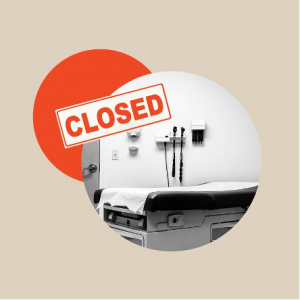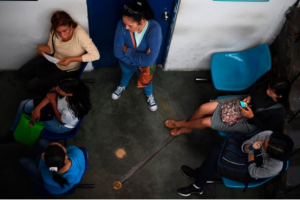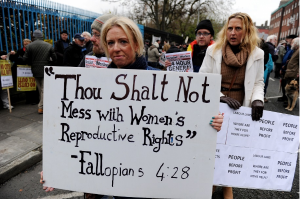 As we all know by now, the United States joined the battle against the Covid-19 pandemic back in early 2020. The effects varied from state-wide shelter in place orders and imposed curfews to state held exam postponements and school campus shutdowns, with a plethora of others in between. Another significant consequence of the Covid-19 public health crisis was the ordered shut down of non-essential businesses across the country. While this order was showcased in the media for its inevitable negative financial impact on the economy, other endured hardships were easily overshadowed. States such as Texas, Ohio, Oklahoma, Indiana, Iowa, and Mississippi used the shut down as an opportunity to impose restrictions on women’s access to abortions. Some Republican governors used their control over health departments to declare abortions as non-essential and posed a ban on the procedures, standing behind the façade that it was an effort to preserve personal protective equipment (“PPE”) for fighting coronavirus. Meanwhile, other states such as Massachusetts, Michigan, New Jersey, and Virginia who similarly banned elective medical procedures, deemed abortions essential and safeguarded pregnancy termination methods during the outbreak. This opposing stance caused an uproar, resulting in reproductive rights activists, such as the American Civil Liberties Union (“ACLU”), to spring into action by filing an assortment of emergency lawsuits in an effort to take a stand for women’s fundamental right to abortion, as established in 1973 by the landmark case Roe v. Wade.
As we all know by now, the United States joined the battle against the Covid-19 pandemic back in early 2020. The effects varied from state-wide shelter in place orders and imposed curfews to state held exam postponements and school campus shutdowns, with a plethora of others in between. Another significant consequence of the Covid-19 public health crisis was the ordered shut down of non-essential businesses across the country. While this order was showcased in the media for its inevitable negative financial impact on the economy, other endured hardships were easily overshadowed. States such as Texas, Ohio, Oklahoma, Indiana, Iowa, and Mississippi used the shut down as an opportunity to impose restrictions on women’s access to abortions. Some Republican governors used their control over health departments to declare abortions as non-essential and posed a ban on the procedures, standing behind the façade that it was an effort to preserve personal protective equipment (“PPE”) for fighting coronavirus. Meanwhile, other states such as Massachusetts, Michigan, New Jersey, and Virginia who similarly banned elective medical procedures, deemed abortions essential and safeguarded pregnancy termination methods during the outbreak. This opposing stance caused an uproar, resulting in reproductive rights activists, such as the American Civil Liberties Union (“ACLU”), to spring into action by filing an assortment of emergency lawsuits in an effort to take a stand for women’s fundamental right to abortion, as established in 1973 by the landmark case Roe v. Wade.

The harsh reality of the ban on abortion is evidenced by Marie Stopes International’s (“MSI”) projection that up to 9.5 million women and girls without access to family planning services during the pandemic may results in as many as 3 million unintended pregnancies and 2.7 million unsafe abortions. Therefore, the argument that the ban on abortion to preserve PPE and save lives is unsubstantiated, given that between 4% to 13% of maternal deaths are caused by unsafe abortions. Hence why, in answering the question of whether the state can use a public health crisis to ban abortion, the answer should be a definitive no.
 In March of 2020, the World Health Organization published clinical guidelines detailing that women’s right to sexual and reproductive healthcare should be treated with recognition and prioritization, irrespective of the pandemic, including access to contraception and safe abortion. Bottomline, the majority of abortions are performed in the first trimester, making them extremely safe. The longer one waits for the procedure, the more complex they get and risk increases. Thus, abortions are time sensitive and an essential part of women’s healthcare as a matter of right. For a society constantly challenging itself to be better and do more to ensure equality, wouldn’t the infringement or even removal of a woman’s fundamental right to abortion just be a step backwards? Covid-19 plagued this country and the world with no warning and offered very little opportunity to control its affects. However, that should not have allowed for state governing bodies to take advantage of a bad situation and tamper with women’s right to abortion by unilaterally stripping the rights in the shadows.
In March of 2020, the World Health Organization published clinical guidelines detailing that women’s right to sexual and reproductive healthcare should be treated with recognition and prioritization, irrespective of the pandemic, including access to contraception and safe abortion. Bottomline, the majority of abortions are performed in the first trimester, making them extremely safe. The longer one waits for the procedure, the more complex they get and risk increases. Thus, abortions are time sensitive and an essential part of women’s healthcare as a matter of right. For a society constantly challenging itself to be better and do more to ensure equality, wouldn’t the infringement or even removal of a woman’s fundamental right to abortion just be a step backwards? Covid-19 plagued this country and the world with no warning and offered very little opportunity to control its affects. However, that should not have allowed for state governing bodies to take advantage of a bad situation and tamper with women’s right to abortion by unilaterally stripping the rights in the shadows.



 As we all know by now, the United States joined the battle against the Covid-19 pandemic back in early 2020. The effects varied from state-wide shelter in place orders and imposed curfews to state held exam postponements and school campus shutdowns, with a plethora of others in between. Another significant consequence of the Covid-19 public health
As we all know by now, the United States joined the battle against the Covid-19 pandemic back in early 2020. The effects varied from state-wide shelter in place orders and imposed curfews to state held exam postponements and school campus shutdowns, with a plethora of others in between. Another significant consequence of the Covid-19 public health 
 In March of 2020, the World Health Organization published clinical guidelines detailing that women’s
In March of 2020, the World Health Organization published clinical guidelines detailing that women’s